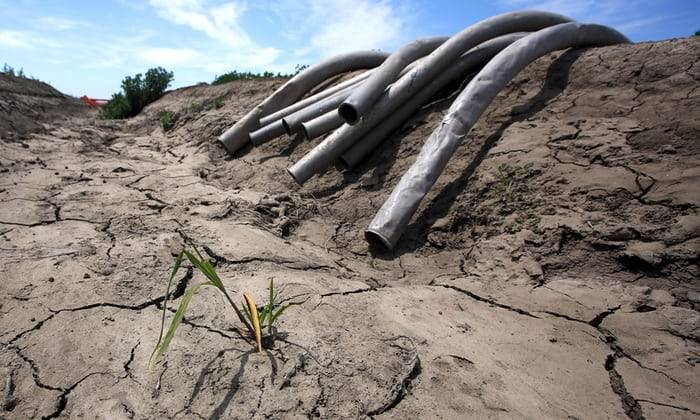Abu Ali carefully crank-starts a generator to pump water from a well out into his parched field in southern Iraq.
There used to be no need for a well in his village, but a creeping drought is now threatening agriculture and livelihoods in the area.
"Last year, the river started to dry up and today we only have wells to supply us with water," the 73-year-old farmer told AFP.
Since childhood, Abu Ali and his family have lived off this land in the village of Sayyed Dakhil, to the east of Nasariyah city some 300 kilometres (180 miles) south of Baghdad.
It cost him $1,600 (1,290 euros) to dig the well, a lifeline that provides access to the water table deep below.
"The water that we draw serves as drinking water for our cows and our sheep, and despite the bitter taste, we also use it to cook and even drink ourselves," said Abu Ali, dressed in a traditional beige robe.
But his family's main supply of drinking water comes from six small reservoirs that are refilled at least once a week for around 20,000 dinars ($17 or 13.50 euros).
Abu Ali is determined to stay put, but the drought has already forced dozens of families to flee more than 20 villages in the area.
Weather patterns are largely to blame for the crisis, according to an engineer with Iraq's ministry of water resources.
"For the second consecutive season, the rains have been poor and temperatures have risen," Mehdi Rashid told AFP.
Marshes under threat
But while rain accounts for 30 percent of Iraq's water resources, the remaining 70 percent is drawn from rivers and marshes shared with Iran, Turkey and Syria, he said.
The diversion of these shared waterways has played a part in Iraq's drought.
"Iran has completely re-routed the course of the Karun river," he said, once a cross-border river and a key water source for Iraqis.
Rashid said Iran had also "built three big dams on the Karaj river", significantly reducing water levels in cross-border wetlands shared by the two countries.
Of the 45 tributaries once shared by Iran and Iraq, only three or four remain viable, said added.
The famous marshes of Mesopotamia, among the largest in the region, are victims of the "worst drought in their history," according to Jomaa al-Daraji.
He works with an organisation trying to protect the UNESCO world heritage site, which stretches from Basra into Dhi Qar province.
Meanwhile, Iraq and Turkey are locked in talks over the latter's controversial Ilisu dam project on the Tigris, which began in 2006.
The Iraqi stretch of the Tigris is downstream from Turkey, leaving it vulnerable to reduced flows.
Along with the mighty Euphrates, the enduring presence of the Tigris river helped give Iraq its nickname: "the land of two rivers".
With water increasingly scarce, Iraq's three major dams and 20 smaller ones are running low.
According to Rashid, the government engineer, the country's reservoirs currently hold about 12 percent of their total collective capacity.
The southern agricultural provinces of Diwaniyah, Muthanna and Missan, home to nearly a quarter of Iraq's population, are also suffering from the drought.
Some 80 percent of the province's agriculture depends on generators and pumps to draw water, according to Ismail Abdel Wahed, head of water resources with Diwaniyah's provincial council.






